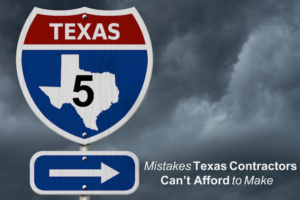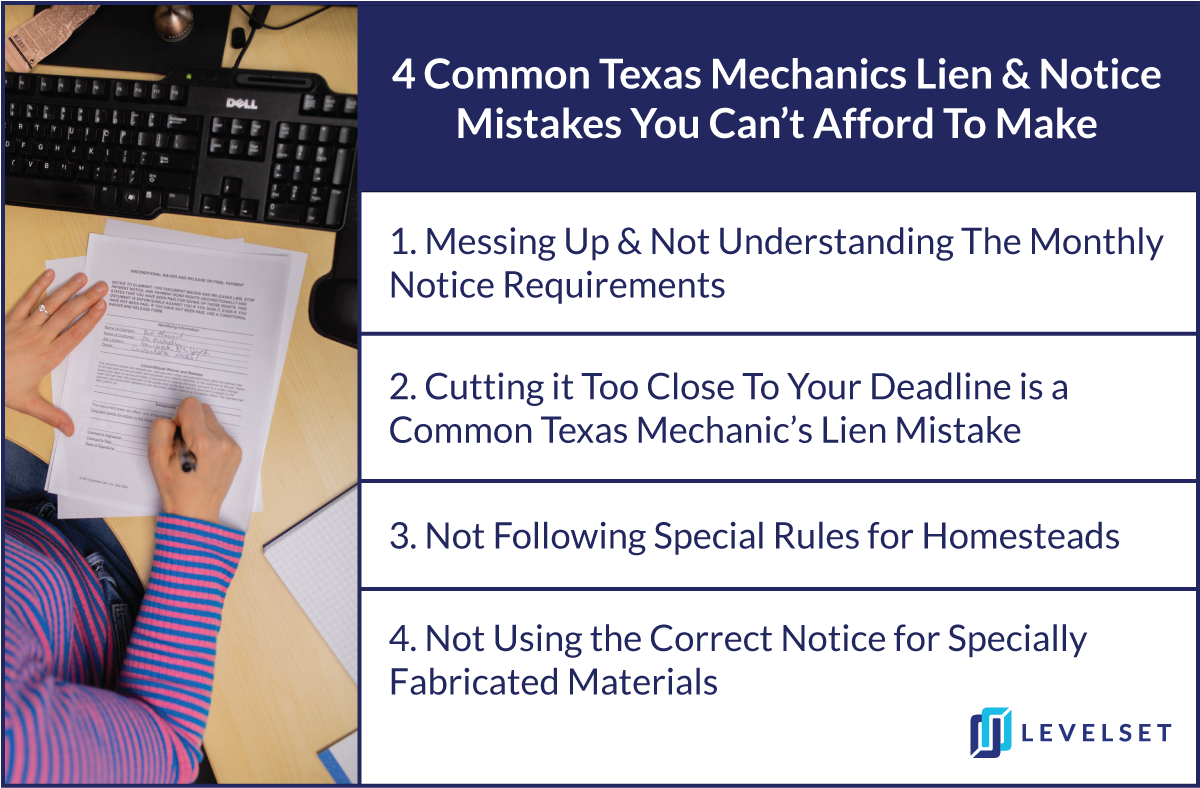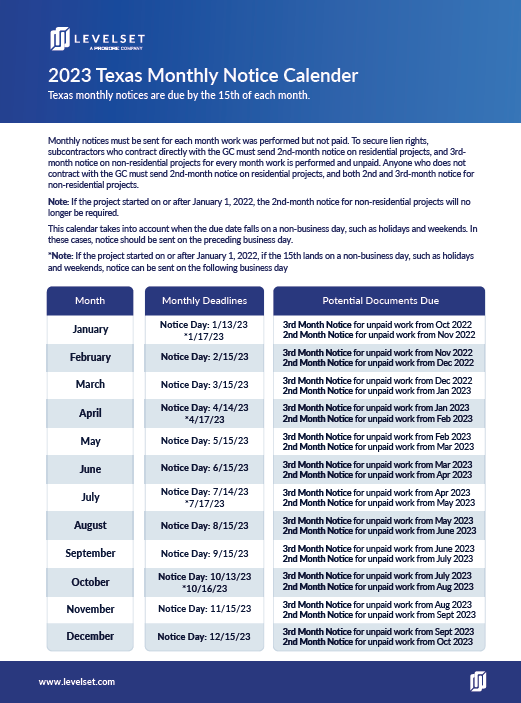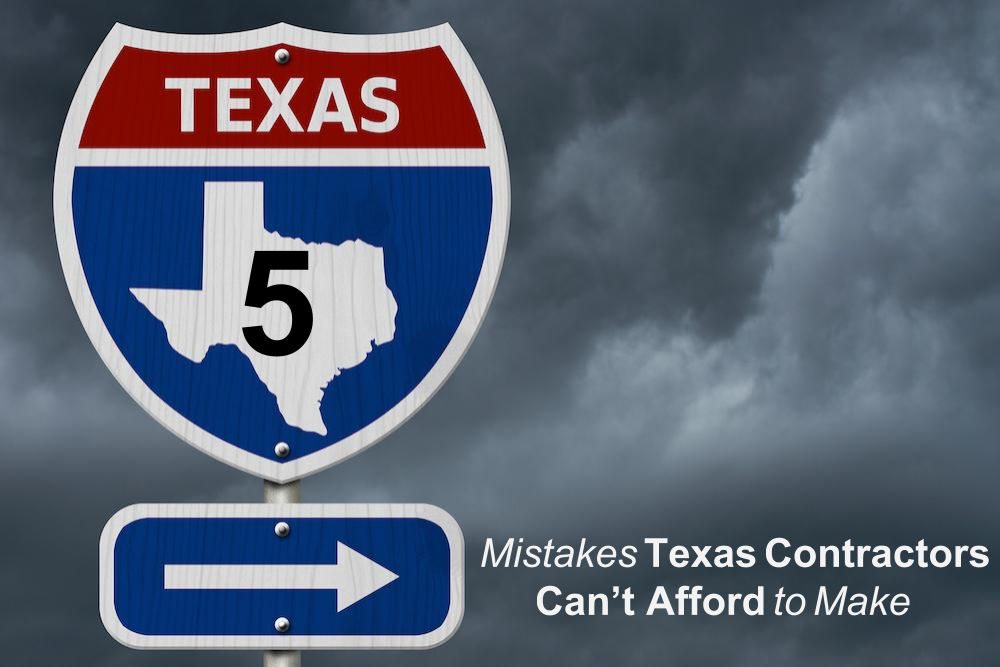
If you’re tasked with collecting payment for construction work, you need to be taking advantage of mechanics liens. And you don’t want to fall into dumb traps and make common Texas mechanic’s lien mistakes.
The problem is that lien and notice management is nuanced, confusing, and bureaucratic, especially in Texas. Yes, as we’ve written on many occasions in the past, the state of Texas has the most complicated and confusing mechanics lien and notice requirements in the entire United States. Bam! There you have it!
But when has any self-respecting Texan ever shied away from a tough fight? Remember the Alamo?!? Taking on impossible challenges is such a common trait in Texas that it’s practically part of the DNA!

Navigating the prerequisites to protect your lien rights is confusing, and small mistakes (with large consequences) happen quite often. Here are 4 common Texas mechanics lien mistakes that contractors can’t afford to make when it comes to getting paid on their projects.
1. Messing Up & Not Understanding The Monthly Notice Requirements
If you’re a subcontractor, sub-sub, material supplier, equipment lessor, or anybody that did not contract directly with the property owner, then you have to send monthly recurring notices in order to protect your right to file a lien. There are a lot of different types of notices sent in construction, including generic preliminary notices, but the Texas notice scheme is extremely unique. To get a step-by-step guide, consult our Step-By-Step Guide to Preparing & Sending Texas Monthly Notices.
Texas monthly notices are due in:
Notices due Thursday, May 15, 2025 at 03:00 PM UTC
By far, the biggest trap for contractors and suppliers in Texas is in messing up compliance with these Texas monthly notices. Here are some of the common places that get confused and misunderstood.
a. Not Sending The Right Notice Document(s)
Texas notices are not one-size-fits-all. You may be required to send one, or several, of the following documents…ad you may have to send these documents more than once. In fact, you may have to send them each and every month, over and over again, to the same parties.
- Disclosure Notice
- List of Subcontractors and Suppliers
- Two Month Notice
- Three Month Notice
- Retainage Notice
- Notice of Specially Fabricated Materials*
*Note: For new projects that started on or after 1/1/22, a Notice of Specially Fabricated Materials will no longer be required to secure lien rights.
b. Not Sending Notices At The Right Time
If you want a headache go read the Texas laws that outline when you need to send all of these notices. It’s a nightmare, and the language is impossible to understand. The timing for the disclosure, retainage, and specially fabricated materials notices are easy (i.e. send them early, right when work begins!). It’s the 2nd & 3rd-month notice deadlines that are tricky. To help, we’ve put together this table for 2nd and 3rd-month notices.

Download the 2023 Texas Monthly Notice Calendar
This calendar takes the guesswork out of calculating the deadline for your Texas monthly notices. We update it annually.
Download the calendarAnd, of course, it’s not always simple. There are always issues that can arise that make it hard to figure out which months to send your notice. For example, check out this question & answer about when you invoice for versus when you ship materials, and how that implicates your Texas monthly notice deadlines: How to handle Texas monthly notices if you invoice months before you ship?
c. Not Sending Notices to the Right People
Texas notices must be sent to the property owner, the general contractor, or both. If you’re doing work on a homestead (see below), you may be required to actually file your contract with the Texas county clerk before beginning work. The contract must also have certain people’s signatures.

The #1 reason liens get rejected: Bad information.
Learn more about job research team. We'll track down and verify all of the job information you need to complete your form and file a valid mechanics lien.
Get your free reportd. Not Sending Notices The Right Way
Notices should be sent via registered or certified mail and must be addressed to the owner or reputed owner or the original contractor, as applicable, at his last known business or residence address.

Discover how a Texas supplier cut their payment collection time in half after using software to send monthly notices.
2. Cutting it Too Close To Your Deadline is a Common Texas Mechanic’s Lien Mistake
Collectors like to avoid sending notices if they can, for a number of reasons: it’s more work, it costs money, it’s believed to send a bad message to customers. But it’s important to remember that sending a notice even just one day late will void your ability to claim a lien for your payment. And that can be extremely expensive.
Because of the unique nature of Texas notice deadlines (they’re always due on the 15th of the month), it’s more common for contractors and suppliers to wait until the last minute to make a decision to send or not send. Invoices from two and three months prior sit on a desk as the collector waits, hopes, and prays that payment for each will come through the door. She tells herself, “They told me the check is in the mail. It’s coming!” All the while, the clock is counting down to the 15th.
Don’t wait! Preparing notices and getting them out the door takes time, and you have to account for that process. It’s better to send a notice for a project that gets paid a couple of days later than to not send a notice and find out that, no, the check was not in the mail.

Need to file a Texas Mechanics Lien?
We’re the Mechanics Lien experts. With us it’s fast, easy, affordable, and done right.
File Now3. Not Following Special Rules for Homesteads
Another common Texas mechanics lien mistake happens when work is being done on a Texas residential job. Many residential properties in Texas are considered Homesteads. This is important to you because the rules and requirements for homesteads are different from those for ordinary residential projects. (see: How do you know if a homeowner is a homestead in Texas?)
If you contracted directly with the homestead owner, the requirements are fairly straightforward. If you did not contract directly with the owner, then you are dependent on the general contractor fulfilling their requirements in order for your lien rights to be protected. That’s right if the person contracting with the homestead owner does not fulfill lien prerequisites, subcontractors, sub-subs, etc. lose their ability to file a lien.
One solution is to communicate with the general contractor. The other way around this is to execute a direct contract with the homestead owner. You can find Homestead mechanics lien requirements here.
4. Not Using the Correct Notice for Specially Fabricated Materials*
If you are providing materials specifically fabricated for a job…you’re at risk of making a common Texas mechanics lien mistake. That’s because these types of materials require special protection. Specially fabricated materials are defined by Texas statute as materials that are not generally suited for or adaptable to use for other projects or sites. People who supply specially fabricated materials have a right to claim a lien even if the materials are not delivered.
Requirements for suppliers of specially fabricated materials are very similar to those for regular material suppliers. However, specially fabricated material suppliers must use a unique notice, the Notice of Specially Fabricated Materials.
*Note: For new projects that started on or after 1/1/22, a Notice of Specially Fabricated Materials will no longer be required to secure lien rights.

Texas rules for mechanics liens and notices are subject to major changes in 2022.
The information on this page has already been updated to reflect the new rules.
Conclusion
Protecting your lien rights in Texas will (1) keep in tact your most valuable collections tool, the mechanic’s lien; and (2) encourage your customers to pay on time. While protecting your lien rights in the lone star state can seem overwhelming, all you need to be successful is knowledge about your project (you already know that) and access to the right tools (you can get that).
Levelset’s resources break down exactly what you need to do in order to protect your lien requirements, for every state in the nation, every project role, and every project type. Levelset’s also provides free templates for notices forms and lien forms.
It only takes non-payment on one project to break the bank. Are you avoiding traps and common Texas mechanics lien mistakes? Are you protecting your lien rights?

Need to file a Texas Mechanics Lien?
We’re the Mechanics Lien experts. With us it’s fast, easy, affordable, and done right.
File Now
